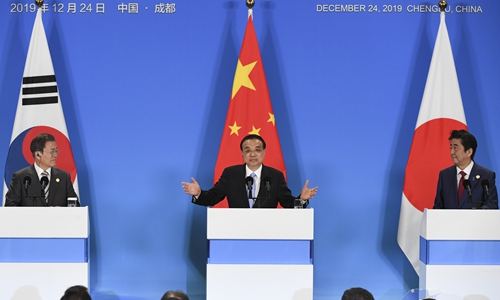HOME >> CHINA
‘New era’ of China-Japan-S.Korea ties shape promising regional integration
By Chen Qingqing Source:Global Times Published: 2019/12/24 23:28:40
‘New era’ of ties shapes promising regional integration

Chinese Premier Li Keqiang (center) speaks during a joint press conference at the Eighth Trilateral Summit between China, Japan and South Korea in Chengdu, Southwest China's Sichuan Province on Tuesday. Photo: AFP
Top officials of China, Japan and South Korea reiterated their commitment to safeguard free trade and reaffirmed their shared goal for regional stability and development following the Eighth Trilateral Summit, with the possibility of a trilateral free trade agreement, offering broader regional collaboration.
The Eighth Trilateral Summit yielded fruitful outcomes, Chinese Premier Li Keqiang said. China, Japan, and South Korea agreed to enhance political trust, work together strategically in boosting regional integration and development.
While China further opens up its market, the country welcomes South Korean and Japanese firms to invest in Chinese sectors, including healthcare, insurance, and securities, Li said at the press conference after the summit.
Faced with rising uncertainties at global stage, the three countries have been continuing feasible cooperation, which is also in line with shared interests, Li said at the opening ceremony of the 7th China-Japan-Republic of Korea Business Summit on Tuesday in Chengdu, capital of Southwest China's Sichuan Province.
The summit is one of the activities marking the 20th anniversary of the trilateral cooperation.
He added that they need to strive to further upgrade regional integration and development.
Li noted that China, Japan, and South Korea are firm supporters of Regional Comprehensive Economic Partnership (RCEP), and should continue carrying out the consensus reached in Bangkok last month, and make sure the agreement is to be signed in 2020.
Meanwhile, the three sides should accelerate China-Japan-South Korea free trade zone negotiations and make concrete progress, Li said.
"It shows FTZ agreement is just around the corner," Zhao Gancheng, a research fellow at the Shanghai Institute for International Studies, told the Global Times on Tuesday.
With the elimination of economic and technical hurdles, the three Northeast Asian countries will be the major force in pushing forward RCEP closer to realization, Zhao said.
They all showed strong willingness in establishing the FTZ, which has been under negotiations for years, he noted.
"However, uncertainties remain, for example, US interference and India's decision on RCEP, which may affect Japan's decision," he said.
China, Japan and South Korea already reached a deal along with 12 other countries on RCEP, a mega Asia-Pacific trade pact, in November after years of negotiations.
The deal is expected to be signed in February 2020, injecting new growth momentum into the Asia-Pacific region which has been hit hard by months-long trade war between China and the US, two of the largest global economies.
Although Japan may follow India's suit if New Delhi decides to reject the mega trade deal at the end, it won't significantly impact the multilateral negotiations among China, Japan and South Korea, considering consensus have already been reached, the analyst told the Global Times.
'New era' for trilateral ties
Japanese Prime Minister Shinzo Abe called for stronger cooperation with China and South Korea, helping build a "new era" of development at the business summit on Tuesday, Japanese broadcaster NHK reported.
Abe made reference to the city of Chengdu, once the capital of Shu in the historical era of the "Three Kingdoms" (220-280) that were rivals.
He said the leaders of the three countries are not fighting each other as the three kingdoms did, according to NHK.
Such a description of "Three Kingdoms" reflected Japan's Asia-centered consciousness, which means Asian people will have the final say on regional order and affairs, Liu Junhong, research fellow of the China Institutes of Contemporary International Relations, told the Global Times.
"To avoid offending the US, Japan has not clarified on this point. But it indeed hopes to establish this trilateral mechanism that would help influence international order," Liu said.
Major Asian economies are greatly influenced by China-US relations in policymaking process, and Japan, as the world's third-largest economy, expects its policies to be more self-dependent, Liu noted.
Analysts believe the trilateral summit has significant implications as the trio is unhindered by political and historical divergences, and are now moving forward in accordance to the changing times amid rising US hegemony and protectionism.
"China has been playing an important role as mediator, as both China-Japan ties and China-South Korea ties are warming up," Zhao said.
Broader cooperation
Business communities from China, Japan, and South Korea issued a joint communiqué on Tuesday, welcoming the outcomes of the summit and vowing to continue forging sustainable ties.
Following the summit on Tuesday, the China Council for the Promotion of International Trade, the Korea Chamber of Commerce and Industry, and Keidanren (the Japan Business Federation) pledged to safeguard free trade and advance regional integration, according to the joint communiqué seen by the Global Times.
"Considering China's advantages in 5G and internet, Japan and South Korea have been advancing largely in IT and big data, so collaboration among the three countries is highly expected," Liu Jianying, an associate research fellow at the Chinese Academy of International Trade and Economic Cooperation, said on Tuesday.
Newspaper headline: Trilateral FTA looms
Posted in: DIPLOMACY